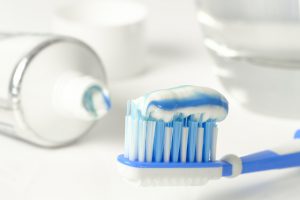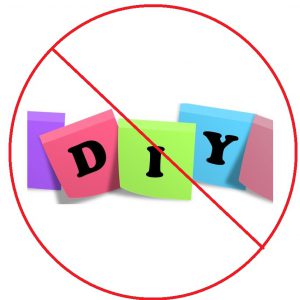Is All-Natural Toothpaste Effective?
Oh, so we’re going to open this can of worms, are we? Should it be a can of worms? No. The reason some people make it into one is that there are actually really good arguments on both sides of the question. Let’s dive in.
The Purpose of Brushing
 One great argument for all natural toothpaste lies in the purpose of brushing your teeth. Why do we brush our teeth in the first place? The quick answer is this: to remove plaque.
One great argument for all natural toothpaste lies in the purpose of brushing your teeth. Why do we brush our teeth in the first place? The quick answer is this: to remove plaque.
Plaque is the soft, whitish buildup that accumulates on your teeth between brushings. It contains bacteria, food debris, and exfoliated cells from the tissue lining the inside of the mouth. Plaque buildup causes both cavities and gum disease.
We remove plaque through the mechanical action of the toothbrush bristles (and floss, too, but that’s another blog topic . . .). As soft toothbrush bristles touch the tooth in gentle circular motions, they disrupt the collection of plaque that is present. No toothpaste is necessary to remove plaque. You can do it simply by brushing with warm water and the proper technique.
So when we consider the purpose of brushing our teeth, the type of toothpaste used is relatively unimportant. Therefore, all natural toothpaste is an acceptable choice.
The Purpose of Toothpaste
 Toothpaste is simply a carrier of certain ingredients that we want to apply to the teeth and gums. It is not essential for removing plaque, as we discussed above. Putting toothpaste on your toothbrush before it touches your teeth is simply a way to get the ingredients in the toothpaste to the teeth. That’s all.
Toothpaste is simply a carrier of certain ingredients that we want to apply to the teeth and gums. It is not essential for removing plaque, as we discussed above. Putting toothpaste on your toothbrush before it touches your teeth is simply a way to get the ingredients in the toothpaste to the teeth. That’s all.
So the actual ingredients of the toothpaste do matter. If you read the labeling of toothpaste, you will see many claims about what the toothpaste does. “Fights cavities”, “Repair”, “Detoxify”, “Whitens teeth”, and many more claims are splattered all over toothpaste packaging. Many of these are valid claims. The validity of others comes only from the fact that the act of brushing your teeth removes plaque, regardless of which toothpaste you use. Effectively, you could say that any toothpaste fights cavities and gum disease, detoxifies, and improves gingivitis.
What “All-Natural” Leaves Out
In general, when a toothpaste claims to be “all natural”, you can read between the lines and understand that it does not contain fluoride. Forgive us for chuckling a little when we say this in rebuttal: fluoride is a mineral that occurs in the ground . . . naturally. There is a lot of controversy surrounding fluoride, and you can learn more about it in our previous blog linked above.
Who Should Use All-Natural Toothpaste
Some people have allergies or other conditions that make the tissue lining the inside of their mouths extremely sensitive to harsh chemicals. Many people are allergic to flavorings contained in toothpaste. If “regular” toothpaste creates a burning or tingling sensation on your lips, cheeks, or tongue, you could have a sensitivity to some of the ingredients.
All natural toothpastes do not contain the foaming detergents and strong flavorings that some regular toothpastes contain. We recommend all natural toothpastes or hypoallergenic toothpastes to patients with multiple food allergies, autoimmune disorders, soft tissue diseases, or other sensitivities.
Who Should Not Use All-Natural Toothpaste
Because all natural toothpastes leave out the fluoride, patients with a high risk for cavities should not use them. Fluoride strengthens tooth enamel, making it more resistant to the attacks of acid and bacteria in the mouth that lead to decay. Certain fluoride compounds can literally stop cavities in their tracks.
Someone who consistently develops new cavities should always use a toothpaste containing fluoride. Many even need prescription toothpaste with a higher concentration of fluoride. By using an all-natural toothpaste, you miss the daily application of enamel-strengthening fluoride and allow the teeth to weaken.
What We Do NOT Mean by All-Natural
 We are not including DIY toothpaste or homemade Pinterest-inspired recipes of toothpaste when we say “all-natural”. We mean something sold over-the-counter or online with claims of being all-natural. The most popular or well-known brand of this is Tom’s of Maine. (FYI, Tom’s does have a formulation that contains fluoride.)
We are not including DIY toothpaste or homemade Pinterest-inspired recipes of toothpaste when we say “all-natural”. We mean something sold over-the-counter or online with claims of being all-natural. The most popular or well-known brand of this is Tom’s of Maine. (FYI, Tom’s does have a formulation that contains fluoride.)
Many DIY toothpastes contain ingredients that are not safe for tooth enamel, like fruit juices and activated charcoal. These not only do not help your teeth; they can actually hurt them by causing acid erosion or abrasion. Just don’t.
More Questions about Which Toothpaste is Right for You?
Call Designer Smiles today to schedule a consultation with Dr. Ann and Dr. Lauren. They can answer any question you may have about your current toothpaste, a new one you are considering, or your unique risk factors that affect your choice.
